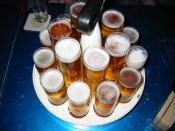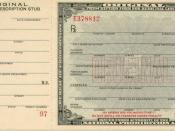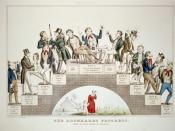Alcohol and American life have had a long and usually friendly relationship. Until the
mid 1800's, alcohol was the staple drink in many homes. This was mainly because of the
customs brought from Europe by the immigrants and settlers who formed our population.
Most people would think nothing of having a strong drink in the morning and wine with
every meal. Children were often given liquor before going to school. All of this began to
change in the 1800's. Early on, a few strict religious interests began to advocate
temperance, which is abstinence from alcohol. Then most major denominations took it up
as a cause. At first, they mainly combated drunkards, and only hard liquor. Then they
progressed to condemning casual drinkers, and beer and wine. Propaganda flooded the
country in the form of temperance books, magazines, plays, and pamphlets. Local
temperance societies sprouted up everywhere. Millions pledged to never touch another
drop of the 'Demon Rum'.
Many of the same progressives who favored abolition jumped
on the temperance bandwagon as well, and overzealously promoted it as the only way for
'decent' people. Progressing until the early 1900's, they gained a large following in the
rural, less advanced areas. Many of these so-called 'Bible Belt' states enacted state
prohibition laws or local option laws which allowed each county or municipality to decide
whether to allow sale of alcohol. When these interests saw the opportunity to glorify
prohibition of alcohol on a nationwide scale as patriotic duty during World War I, they
took full advantage. While America scarcely paid attention, a small minority put into
effect a law which would change the entire moral fabric of the nation, and eventually
would prove that if the majority of people do not wish to follow a law, the government
has not the power...


